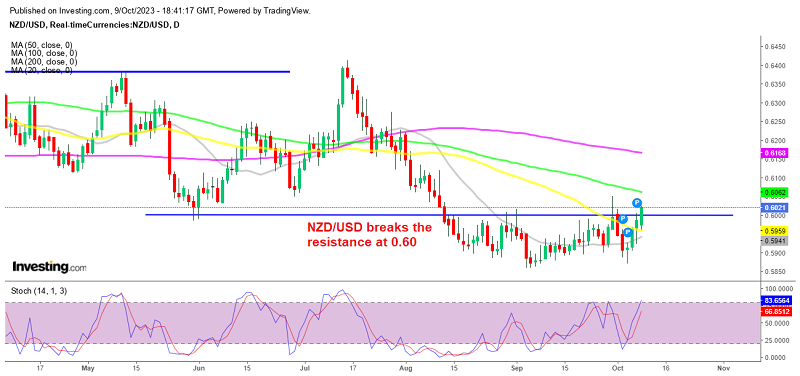









The recent fluctuations in currency exchange rates have had a significant impact on market sentiment and interest rates. The GBP/USD exchange rate has rebounded in the past three days, accompanied by the formation of a bullish technical pattern known as the Three White Soldiers [fbf99dcd]. On the other hand, GBP/AUD dipped below the 1.9100 level as weaker outlook in the UK combined with the resilience of the U.S. economy weighed on sterling [ec7cec48]. The Australian dollar (AUD) rose on Tuesday following an unexpected rise in Australian consumer confidence [fbf99dcd]. The rise in consumer confidence eases recessionary fears and drives demand for the Aussie dollar. However, economic conditions in the next 12 months indicate a tricky time ahead [2a392213]. The Australian Dollar weakened due to the recovery in the US Dollar [57d846ff]. The NZD/USD pair has risen above the 0.60 level as risk sentiment improves unexpectedly [f4c551ba]. The Kiwi has been down for more than two months, but recent recovery in China's economy and positive employment reports from the US have boosted risk sentiment. The Reserve Bank of New Zealand (RBNZ) has decided to keep the cash rate constant at 5.50%, indicating that interest rates may not be raised again [f4c551ba]. The Australian dollar is still being protected by its immense short, but that should get worked off somewhat in this great market consolidation as well [a447e922]. The Australian Dollar (AUD) halts the five-day winning streak that began last week on a downbeat US Dollar (USD). The AUD/USD pair is strengthening as the likelihood of another interest rate hike by the Reserve Bank of Australia (RBA) increases. This trend can be linked to growing inflation expectations fueled by higher oil prices [91745299]. The Australian and New Zealand dollars have rallied as risk sentiment improves and interest rate outlooks diverge [00a7d337].
The article from Interest.co.nz by Roger J Kerr discusses the impact of differences in inflation and interest rates on exchange rate movements [9e33b3e7]. It explores whether high-yielding currencies like the NZD and AUD will come back into favor with global investors and traders. The current interest rate differential between New Zealand and the US is examined, with the argument that the New Zealand interest rate market is pricing in too many cuts too early. The article also discusses the inflation outlook for New Zealand and the US, suggesting that New Zealand's inflation rate is set to reduce while the US inflation rate is on track to fall below 3.00%. The future interest rate differentials and inflation trends are seen as key factors in determining exchange rate movements.
According to an article from TT Newsday by Gordon Laughlin, declining oil production and lack of gas revenue can lead to a decrease in foreign exchange earnings, weakening the local currency. This can intensify economic instability and fuel inflationary pressures as import costs rise. Governments may tighten fiscal policies or increase borrowing to maintain budgetary balance, leading to investor skepticism and further depreciation of the currency. Geopolitical tensions, regulatory changes, and market speculation can amplify volatility in the forex market. Diversifying economic strategies is crucial to mitigate risks effectively [78b31b64].
Overall, the fluctuations in currency exchange rates, market sentiment, and interest rates have been influenced by various factors such as economic outlook, consumer confidence, risk sentiment, interest rate differentials, economic fundamentals, geopolitical events, declining oil production, and lack of gas revenue. As global economic conditions continue to evolve, these factors will likely continue to shape the currency markets [9e33b3e7] [78b31b64].